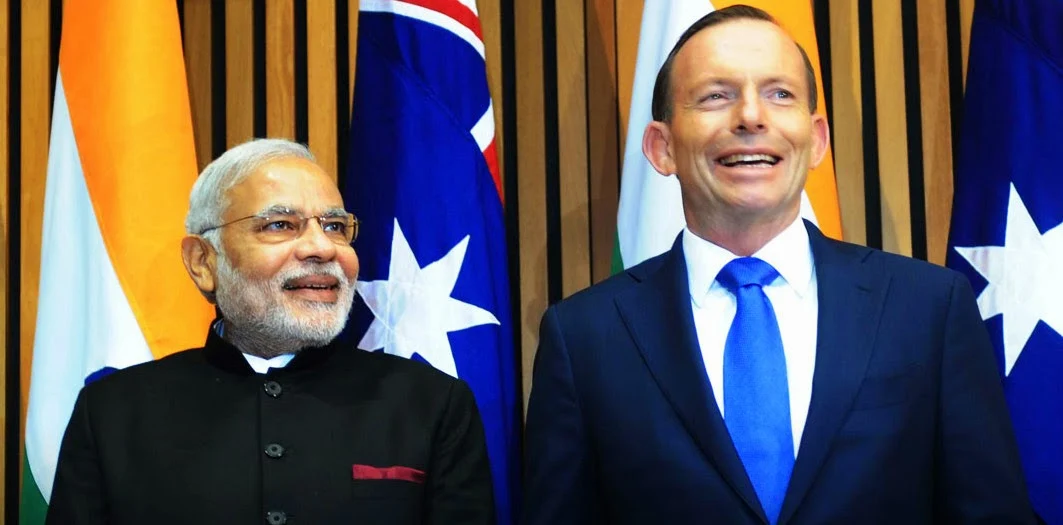 |
Tony Abbott to Xi Jinping : "when I listened to the President today, some of the
shadows over our region & over our world lifted & the sun did indeed shine brightly"
|
Said : Hugh White, Professor of Strategic Studies in the School of International, Political & Strategic Studies at the Australian National University (Lowy Institute), in his post in The Sydney Morning Herald titled : "Abbott clueless on how to handle US and China."
Hugh, supposed to be a prominent analyst of US-China and
Australian affairs, has made several very wild remarks in the above post which,
of course, must be based on his deep analysis and long experience in this
field. His post finds prominent position on twitter today and has been widely publicized,
and perhaps acknowledged, too.
Before I explain why I call Hugh's remarks 'wild', let's
have a quick glance at the summary of his major remarks:
- Tony Abbott rejected stern warnings from Barak Obama not to get too close to China. He ignored Obama's advice which implied that the US offers co-operation and liberty, while China offers conflict and oppression. Obama's purpose was to warn Tony Abbott against accepting Beijing's vision of a peaceful and harmonious Asian future under Chinese leadership in return for a free trade agreement (ChAFTA). British PM David Cameron also issued exactly the same warning when he spoke to Australian parliament just the day before Obama's address.
- Abbott trusted President Xi's assurances in his speech that Australia could look forward to a safe and prosperous future under China's regional leadership - as long as "we respect each other's core interests and major concerns." These assurances came after Xi calmly and confidently asserted that China would be "the big guy in the room" in Asia in future.
- Later, at the State Dinner for Xi after his speech, Abbott praised Xi for his commitment to democracy and a rule-based international order. And in what sounded like a direct repudiation of Obama's dark warnings, Abbott went so far as to say that "when I listened to the President today, some of the shadows over our region and over our world lifted and the sun did indeed shine brightly".
- So why did Abbott do it? According to Hugh, the answer to this question cannot be the free trade agreement with China or Obama's direct attack on Abbott's climate change policy. Hugh says Abbott does not know what he is doing. Despite the speeches he has heard over the past 10 days, he underestimates how stark the rivalry between America and China has become, and he overestimates Australia's ability to stand above it.
- According to Hugh's analysis : "Tony Abbott probably believes that what he said last week will soon be forgotten, and he can return to his alignment with the US and Japan against China whenever he likes, with the free trade deal in his pocket. He perhaps mistakes such patent insincerity for clever diplomacy. He thinks he has struck a careful and clever balance between China and the US, allowing Australia to maintain a close alliance with one while expanding trade with the other. In fact he is swinging helplessly between the two poles of regional power, siding with the US one day and China the next, without any clear conception of where we want to end up."
- Hugh concludes his analysis: "In the end we cannot afford to side with either of them. The only way to protect Australia's immense interests in the Asian power struggle that came to our shores last week is to think for ourselves about what outcome suits us best, and to act as best we can to promote it. Whether we try to do that or not is the real choice we face."
 |
| Hugh White |
Having gone through Hugh's earlier views “Xi and hiscolleagues believe that the gravitational force of China’s economy will pullAustralia into its political and strategic orbit and keep it there,” I think he
is immensely confused in determining or even in suggesting what suits
Australians best in the current scenario. In making above remarks, Hugh is
contradicting himself at nearly every stage. For example, when he refers
Abbott's handling of Xi as underestimation of stark rivalry between America and
China, and overestimation of Australia's ability to stand above it, what exactly
he wants to convey. Hugh should be in a position to indicate and describe the
level of Australia's ability to stand above the prevailing level of US-China
rivalry. Is it really possible to remain non-aligned in such a rivalry? Does
clever diplomacy mean merely trying to be seen not sided with either China or
US while each thinks you are sided with the rival? Is practicing this so
simple? It may appear so to analysts who do not have to involve themselves in
any decision making process but those running the affairs of their countries as
the final decision makers cannot afford to delay the final choice forever. One
may call Tony Abbott's decision to cooperate with China a patent insincerity or
clever diplomacy but that is what he thought to be the best possible choice.
Somehow, I tend to be supportive to him except that he could have avoided
excessive praise of the Chinese leader and used more diplomatic language in
doing so and in dealing with him. In this context I find Hugh's remarks 'wild' because Abbott is being criticized for wrong reasons.
Obama would like India to play a greater role :
"We support a greater role in the Asia-Pacific for India, which is the world's largest democracy. Together, we can improve maritime security, upholding the freedom of navigation, and encouraging territorial disputes are resolved peacefully."
- President Obama at the G20 summit in Australia
I am sure Prime Minister Narendra Modi did a better job at
that and Obama should be really pleased with India. Although Modi also committed similar mistakes, he made his choice very clear
right at the first opportunity he got. He knows whom to trust and work with
from a long-term perspective. The Commerce and politics have their distinct
dividing lines but can co-exist in today's globalized world so that one can be
a political rival but a trade partner at the same time. China wants to make
every nation dependent on her for commerce while keeping the controversial
boundary issues for future settlement when they hope no one capable to oppose
will exist. I am sure Abbot did what he did out of the trade benefits that he
could have done without praising Xi. And certainly not for Xi's
"commitment to democracy and a rule-based international order."


